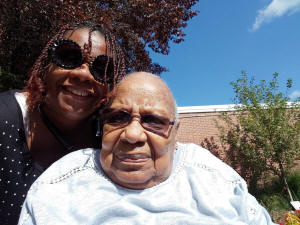At the urging of nursing homes, a law is amended and COVID court claims
are slowed
 Send a link to a friend
Send a link to a friend
 [January 28, 2021]
By Tom Hals [January 28, 2021]
By Tom Hals
(Reuters) - Garnice Robertson wants
accountability for her mother's death from COVID-19 caught while she was
living at a Kansas nursing home that allegedly failed to prevent an
outbreak of the disease. An unexpected legal hurdle stands in her way.
The nursing home argues it has complete legal immunity for lawsuits like
Robertson's stemming from COVID-19. It cites recent changes to a 2005
law by the former Trump administration that had been sought by the
senior care industry.
The law known as the PREP Act was originally designed to encourage
production of emergency vaccines during an epidemic by granting legal
immunity to drug developers.
Riverbend Post-Acute Rehabilitation of Kansas City, Kansas, where
Robertson's mother allegedly became infected, is one of at least 36
nursing homes and senior living facilities that have cited the law as a
defense.

Facilities across 14 states, where more than 650 residents died, have
argued they should be immune from wrongful death cases - an early sign
of how the PREP Act could be used by a range of businesses to fend off
lawsuits resulting from the pandemic.
No judge has yet adopted the nursing homes' view of the law, but those
arguments, and disputes over which court should hear the case - federal
or state - have led to months of delays, preventing Robertson's lawyers
from getting records and interviewing witnesses critical to her case,
the lawyers said.
Robertson, whose lawsuit was moved to federal court in Topeka, Kansas by
Riverbend, said she was upset by the nursing home's use of the law.
"If I'm feeling the way I feel, how do you think all these other people
feel?" she said. "It's just not right."
Riverbend, which is affiliated with the publicly traded Ensign Group
Inc, and its lawyers did not respond to a request for comment.
IMMUNITY EXTENDED TO FIGHT COVID
The Public Readiness and Emergency Preparedness (PREP) Act was
originally meant to jumpstart U.S. defenses against a possible avian flu
epidemic or bioterrorist attack.
It authorizes the Secretary of the Department of Health and Human
Services (HHS), during a public health emergency, to shield from
liability makers of "countermeasures" such as diagnostic tests,
protective gear and vaccines like those developed by Pfizer Inc,
Germany's BioNTech and Moderna Inc.
The PREP Act does not apply in instances of serious injury or death
caused by "willful misconduct".
When the PREP Act shield applies, the injured person instead can seek
compensation from a government fund, although most claims are denied.
Former HHS Secretary Alex Azar invoked the PREP Act in March in response
to the coronavirus pandemic, and since then the agency has issued
amendments and guidance as recently as Jan. 12 to broaden the reach of
the law.
The agency guidance included criticism of rulings that went against
defendants, including Riverbend.
"They have made the arguments for the defendants better than the
existing defense lawyers," said Jonathan Steele, Robertson's lawyer, of
the HHS guidance. "It's unprecedented."
Some changes were sought by the type of facility operators now defending
against lawsuits.
In August, in response to a query from a lawyer at a lobbying firm,
then-HHS general counsel Robert Charrow wrote that senior living
facilities were covered by the PREP Act if they were using approved
products to fight the pandemic.
HHS also said in recent months the PREP Act applied in situations where,
while trying to comply with health regulations, an organization failed
to take an action such as testing - which is an allegation in most of
the nursing home lawsuits.
LeadingAge, a group that represents non-profit nursing homes and other
service providers, sought the clarification in March, when masks and
other protective gear were in short supply.
LeadingAge, one of several elder care groups that called for greater
protection, declined to comment. The group does not represent Ensign.
HHS has said it wants to provide legal certainty to organizations that
they will be immune from good-faith mistakes when trying to comply with
health guidelines and ensure a unified national response against the
spread of COVID-19.
[to top of second column]
|


HHS did not respond to a request for comment regarding the agency's
plans under a Biden administration.
Acting HHS Secretary Norris Cochran said in a letter to state
governors on Friday that they could expect continued use of PREP Act
declarations to support the fight against the pandemic.
More than 100,000 residents of U.S. nursing homes and senior living
facilities have died from COVID-19. Some attorneys said that without
some form of immunity, litigation over a novel airborne illness that
could be spread by asymptomatic carriers could swamp the industry.
BUYING TIME?
So far, seven federal judges have issued preliminary rulings, and
all of them sided with the plaintiffs and ordered the cases returned
to state court, Reuters found.
Six of the rulings were issued before HHS amended the PREP Act in
December to declare that for consistent interpretation of the law
the cases should be heard in federal court, which was reshaped by
former President Donald Trump and is seen as more favorable to
companies.
Only a few of the rulings touched on the question of PREP Act
immunity, which nursing homes can still use as a defense in state
court.
Just raising the PREP Act defense can complicate procedures in a way
that could impact future cases, said Mike Duff, a professor at the
University of Wyoming College of Law.
"Time is money and complexity is time and the more complexity in a
case means the less likely the wrongful death claimants will find
lawyers to represent them," he said.

Nursing homes have used that HHS guidance to try to move cases from
state court, adding delays.
For example, the family of Vincent Martin sued Hollywood Premier
Healthcare Center of Los Angeles in state court a month after Martin
died of COVID-19 in April.
The nursing home, where at least 11 residents died, cited the PREP
Act to have the lawsuit moved to federal court.
The federal judge, however, sided with the family and sent it back
to state court.
In January, armed with fresh guidance from HHS, Hollywood had the
case moved back to federal court a second time, where it is pending.
U.S. District Court Judge Dale Fischer said Hollywood's attempt to
keep the case in federal court raised the possibility the move was
"a cynical, strategic way to stall cases and to extract
concessions."
Hollywood and other facilities are not unreasonably delaying
discovery, but are applying the law and HHS guidance which makes
clear the cases belong in federal court, said Kim Cruz, a lawyer for
Hollywood, in an email.
'UNFAIR' TACTICS
Robertson, whose case has been similarly removed to federal court,
called Riverbend's legal tactics unfair and she is waiting to gets
answers about her mother's care.
Her mother, Georgia Clardy, had been a resident since 2017 at
Riverbend.
She was taken to a hospital in March for a broken femur and, during
her absence, Robertson said coronavirus entered and spread within
the Riverbend facility.
The lawsuit alleges Riverbend's negligence included a lack of
adequate staff, allowing infected employees to enter the facility
and a failure to adopt social distancing.
Robertson said she would have brought her mother home from the
hospital rather than returning her to Riverbend if the facility had
told her there was an outbreak.
"Once I found out she was diagnosed with COVID nobody wanted to talk
about it," said Robertson. "That was very disturbing for me."
The judge in Robertson's case has set the next hearing for February.
[© 2021 Thomson Reuters. All rights
reserved.] Copyright 2021 Reuters. All rights reserved. This material may not be published,
broadcast, rewritten or redistributed.
Thompson Reuters is solely responsible for this content. |